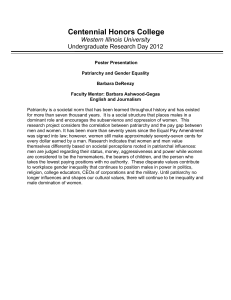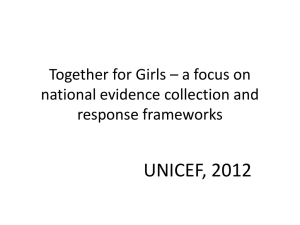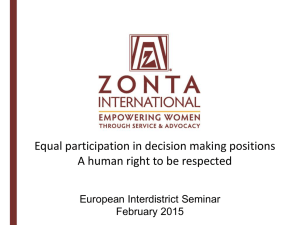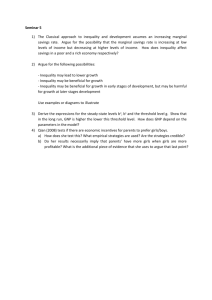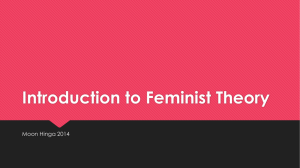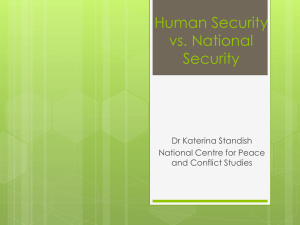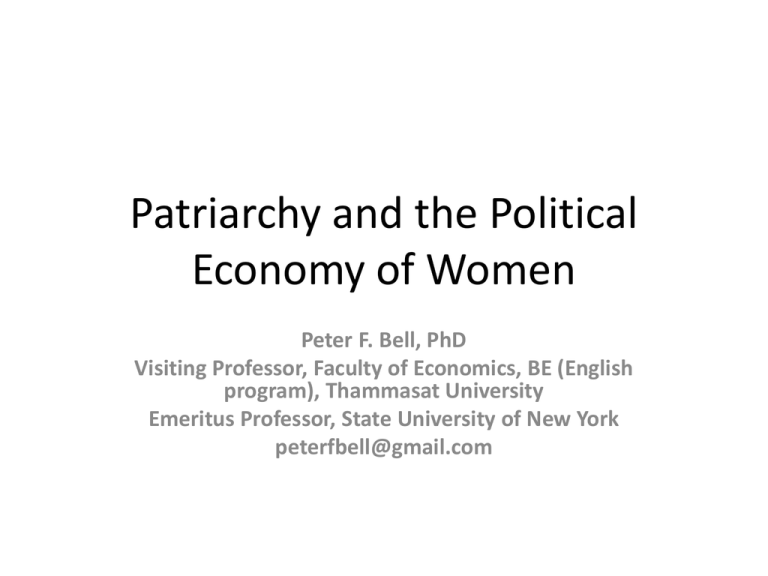
Patriarchy and the Political
Economy of Women
Peter F. Bell, PhD
Visiting Professor, Faculty of Economics, BE (English
program), Thammasat University
Emeritus Professor, State University of New York
peterfbell@gmail.com
Central Arguments
• Human right and women’s rights is central
question of 21st century.
• Economics is genderlesss, must be engendered.
• Economists have belatedly discovered value of
investment in women in development.
• Gender inequality, lack of empowerment, and
persistent violence against women require a new
approach (“paradigm”) that incorporates
patriarchy.
“Women Hold up Half the Sky”
• Paradox : women produce much of the world’s
wealth but own only 10 percent of the resources.
• Issue of social justice, but also opportunity cost:
failure to include women leads to inefficient and
wasteful of resources.
• Much of women’s work not counted as “work”,
but seen as extension of their role as women, or
housewives.
Investment in Women
• Gender a “soft subject”
• Investment in women is essential for growth
• In the early 1990s, the United Nations and the World Bank
began to proclaim the potential resource of women and girls:
• “Unless development in engendered, it is endangered”
UNDP, Human Development Report1995
• “Investment in girls’ education may well be the highestreturn investment available in the developing world.” Larry
Summers, former chief economist of the World Bank.
• “Women are the key to ending hunger in Africa,”
declared the Hunger Project.
• The Center for Global Development issued a major
report explaining “why and how to put girls at the
center of development.” CARE took women and girls
as the centerpiece of its anti-poverty efforts.
• “Gender inequality hurts economic growth,”
Goldman Sachs concluded in a 2008 research report
that emphasized how much developing countries could
improve their economic performance by educating
girls.
• “Investment in girls’ education may well be the highestreturn investment available in the developing world.”
Larry Summers, former chief economist of the World
Bank.
• Private aid groups and foundations shifted gears as
well. “Women are the key to ending hunger in Africa,”
declared the Hunger Project.
• The Center for Global Development issued a major
report explaining “why and how to put girls at the
center of development.” CARE took women and girls
as the centerpiece of its anti-poverty programs.
• “Gender inequality hurts economic
growth,” Goldman Sachs concluded in a 2008
research report that emphasized how much
developing countries could improve their
economic performance by educating girls.
The Problem
• Political economy of women is not only about gender
inequality, but deeper issues of empowerment
freedom from violence., self-determination
• One in four women subject to physical or sexual
assault in their life time.
• Thailand 7th most dangerous country for women
(after Afghanistan, Congo, Pakistan, India, Somalia;)
includes maternal death, rape, physical attack.
http://www.who.int/gender/violence/who_multicountry_
study/fact_sheets/Thailand2.pdf
Beyond Economics
• Genderless Economics
• Build around “Economic Man” (androcentric
view)
• Models are incomplete, exclude critical
variables. Poor science!!
Many issues not adequately explained in
conventional theory: gender gap,
persistent disadvantage of women in
terms of: education, access to health
care, legal rights, lack of political
empowerment, jjob segregation.
Thailand’s Economy “Built on the
Backs of Women”
• In Thailand the economic miracle heralded by the
World Bank in the 1980’s and 1990s (that ended
in the crash of 1997)was “Built on the backs of
Women”(title of an earlier article).
• Women consisted of 80 percent of the labor force
in the 10 largest export industries, performed
unpaid agricultural work, housework, subsistence
production, and provided the bait for the
lucrative tourist industry.
Need for new Paradigm
Paradigms (=theoretical world view)
• Need for new paradigm arises in face of radical
changes in social order, or of facts that cannot be
explained through existing theoretical framework, (e.g.
Great Depression and rise of Keynesian economics.)
• New paradigm always resisted by status quo.
(could not get job at an American university in 1960’s if
you were Keynesian)
Towards a new paradigm.
(“Beyond Economic Man”)
• Patriarchy is core concept in political economy
• Provides theoretical basis for understanding
gender inequality (and gendered violence)
• Patriarchy is a set of gendered power relations
that derive from the sexual division of labor.
Capitalist Patriarchy
Four building blocks in the emergence of the
modern (capitalist) patriarchal system (that arose in
Europe from 15th-17th century: Maria Mies,
Patriarchy and Accumulation on a World Scale):
(a) colonialism, (b) witch hunts, (c) development of
modern scientific method, (d) “housewivization.”
• Each represent a development and reinforcement
of the sexual divison of labor, or heriarchy of
male control.
• Class and gender interwoven.
Globalization
• Globalization has causes major changes n
socioeconomic order, many with negative effects
on women.
• Increased migration, trafficking, export zones,
scramble for valuable resources
• Jacqui True, The Political Economy of Violence
Against Women.
• Thousands of young factory workers in Juarez
have disappeared, found tortured, mutilated and
sexually assaulted.
• One million women in DR of Congo officially
raped each year (according to UN Data)
• Sexual assault and torture of women in India,
including five year old.
• UN has coined term “gendercide” or femicide” to
describe massive killing and brutalization of
women.
• Patriarchy makes such pheonomena easier to
understand sit arise from male entitlement,
objectification of women, high rates of violence,
including domestic violence.
Legislative Progress
• Thailand has been a member of the Convention on the Elimination
of All Forms of Discrimination Against Women (CEDAW) since 1995.
•
The implementation of the CEDAW and the Beijing Platform for
Action (BPFA) have had a visible impact on the Thai's legislation in
the aspects of women protection and the progress toward gender
equality in the country.
• Protection of Domestic Violence Victims Act (2007), the
amendment made to the Penal Code to prevent women from being
raped by their own spouse, and the indications of gender inequality
are also implemented in the recent constitutions
Beyond “Economic Man”
• Çhallenge existing sexual division of labor, and
patriarchy.
• Replace economic man with new concept of
work, of human and gender development,
beyond equality, a society based on feminine
principle.
• Men already involved in this struggle.

